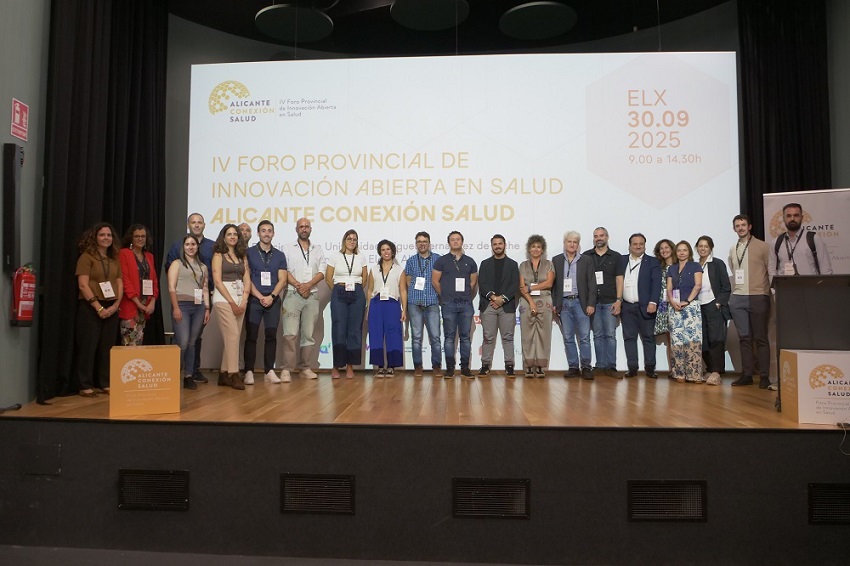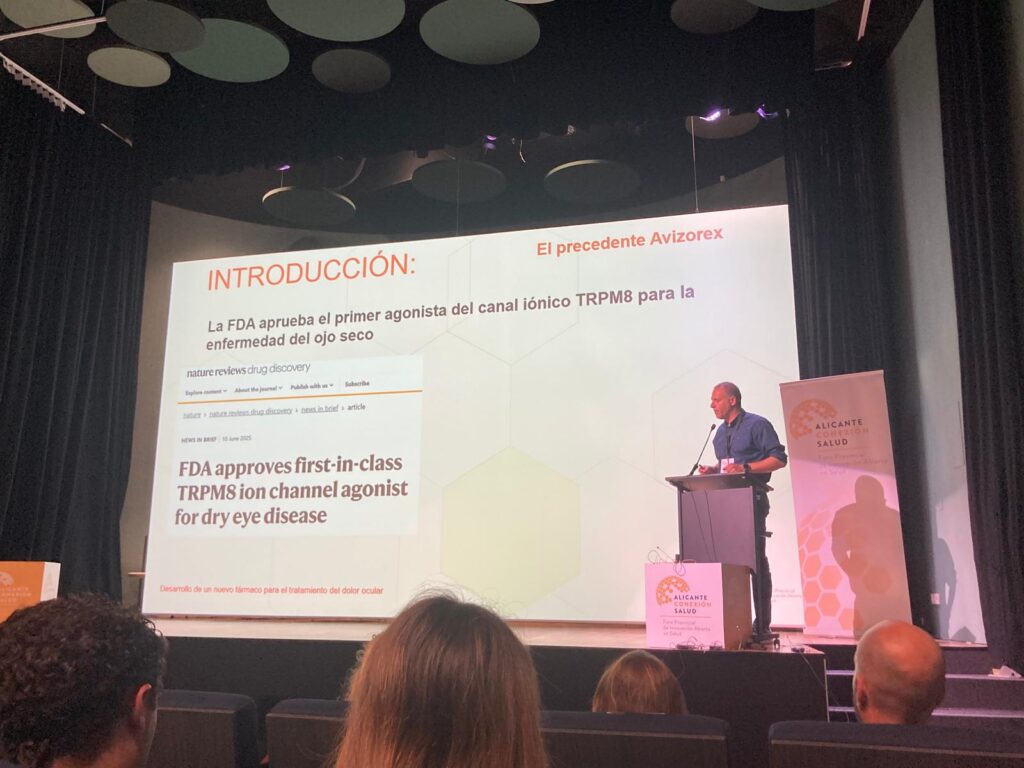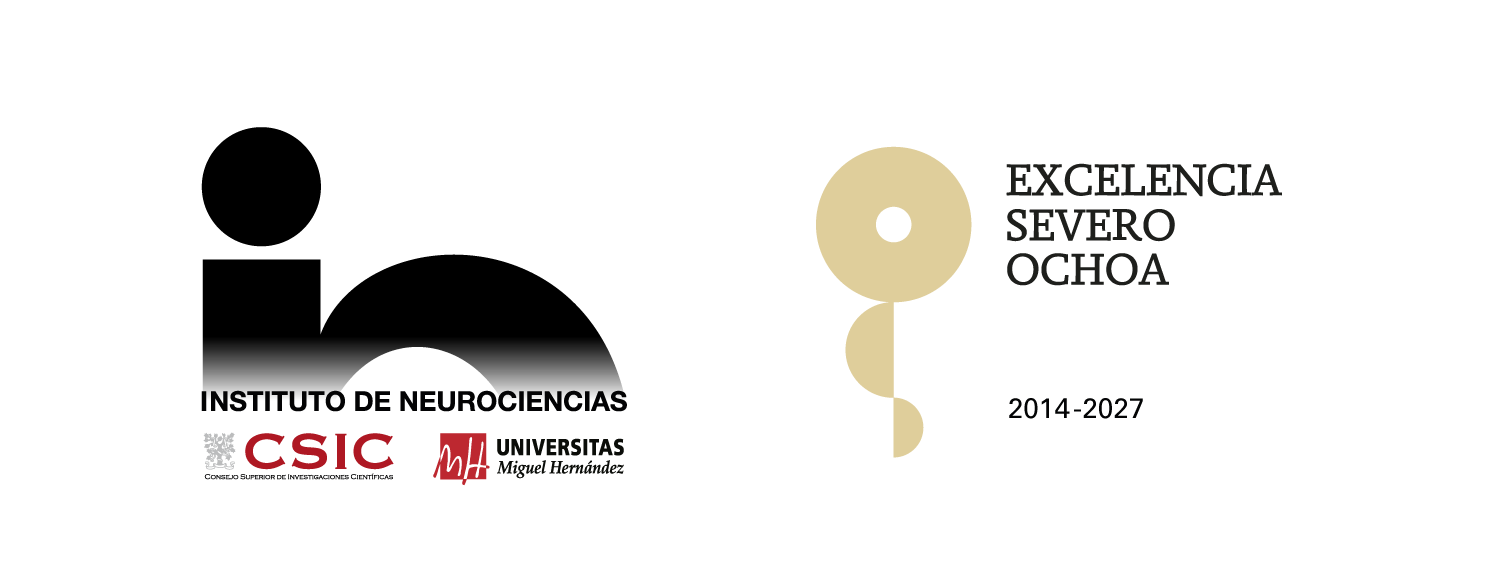Alicante Conexión Salud celebrates its 4th edition and consolidates the province as a benchmark in healthcare innovation
2 de October de 2025
- More than 80 professionals took part in this edition, considered a key meeting point for health innovation.
- Researcher Víctor Meseguer presented a project for the development of a new drug to treat ocular pain.

Participants at the 4th edition of Alicante Conexión Salud. Source: UMH
The 4th edition of the provincial open health innovation forum, Alicante Conexión Salud, took place on 30 September at the Valona Building of Miguel Hernández University (UMH), bringing together 85 professionals from the sector. The event has consolidated itself as a key meeting place for researchers, healthcare personnel, companies, and citizens committed to driving healthcare innovation.
The forum, attended by representatives of strategic entities from across the province, promoted new alliances in which knowledge was shared and the current challenges and opportunities of the healthcare system were analysed. The opening session featured Ángel Antonio Carbonell, Vice-Rector for Research and Knowledge Transfer at UMH, and Andrés Antón, Vice-President of BIOVAL Alicante, the BIO cluster of the Valencian Community, along with the innovation agents of the organizing entities.
“The 4th edition of Alicante Conexión Salud has reaffirmed the central role of Alicante’s ecosystem in healthcare innovation, fostering public-private collaboration, citizen involvement, and a commitment to developing high-impact solutions for the healthcare system”, said Carbonell.
This edition was organised by Fundación Fisabio, the Alicante Institute for Health and Biomedical Research (ISABIAL), BIOVAL, the science parks of UMH and the University of Alicante (UA), the Institute for Research, Development and Innovation in Health Biotechnology of Elche (IDIBE), the Scientific Unit for Business Innovation of the Institute for Neuroscience CSIC-UMH (IN.Pulse), and the Office for the Transfer of Research Results of the UA (OTRI-UA).
The event also featured participation from the three provincial technology institutes (AIJU, INESCOP, and AITEX), Alicante Futura, the Dravet Syndrome Foundation, and companies such as FutuRS, Oscillum, European Institute of Exercise and Health, and Neurovital – Institute for Advanced Rehabilitation.
Challenges and innovative solutions in healthcare
The meeting opened with a keynote on the potential of biotechnology in Alicante, setting the stage for the technical sessions. Throughout the day, key issues were addressed, such as public-private collaboration, citizen participation in R&D&I projects, and the presentation of innovative projects in strategic health areas.
Initiatives presented included Alicante innovador, conectado y competitivo, the Green Health-HUBi, the Microbiome Hub Microbionet (Fisabio), and the iDiaFOOT network (INESCOP). Representatives from patient associations and public administration also highlighted the importance of actively involving citizens in health research.
On the scientific and technological side, cutting-edge projects were showcased, including new biomaterials and smart textiles (AITEX), a human innervated skin prototype for the study of neuropathic pain (IDIBE), and an artificial intelligence platform for the early detection of Alzheimer’s disease through voice analysis (University of Alicante).
A highlight of this block was the intervention of Víctor Meseguer, co-leader of the Ocular Neurobiology group at the Institute for Neuroscience CSIC-UMH, who presented progress on a project aimed at developing a new drug for the treatment of ocular pain—a clinical challenge with significant impact on patients’ quality of life.

Researcher Víctor Meseguer, from the Institute for Neuroscience CSIC-UMH, presenting his project on the development of a new drug for ocular pain treatment at Alicante Conexión Salud. Source: IN CSIC-UMH.
The forum also included a session of technological pitches, where researchers and companies presented solutions for diagnostics, treatment, and rehabilitation. Proposals included CDK4 inhibitors for glioblastoma treatment, virtual reality systems for rehabilitation, 3D simulations for surgery, and other innovative clinical devices.
The day concluded with a round of bilateral meetings, facilitating direct contact between companies, researchers, and healthcare professionals, and fostering strategic alliances and new opportunities for joint development.
This initiative is co-funded by the Valencian Institute for Business Competitiveness and Innovation (IVACE +i, Generalitat Valenciana) and the European Union through the European Regional Development Fund (ERDF) Operational Programme of the Valencian Community 2021-2027 (INNTA1/2023/34).
More information in the attached program (Spanish).
Source: Valencian Ministry of Health (sec.comunicacion@gva.es) / Institute for Neurosciences CSIC-UMH (in.comunicacion@umh.es)

 Español
Español